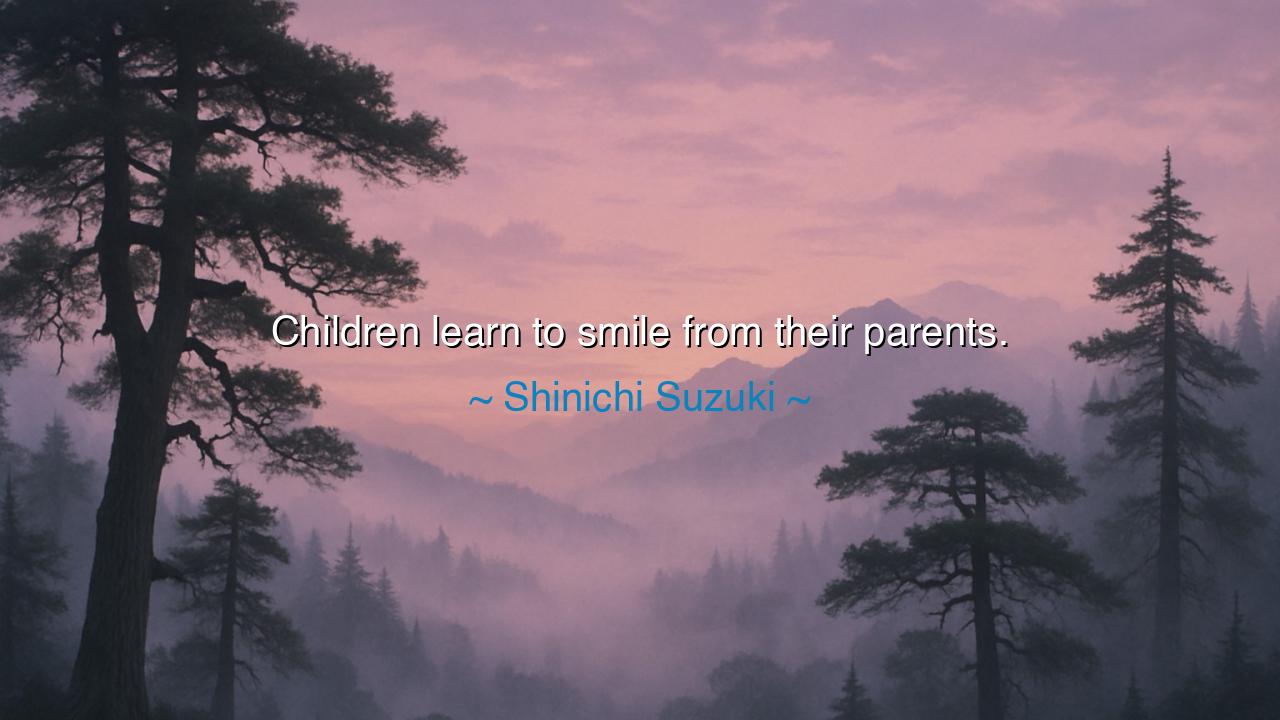
Children learn to smile from their parents.






The words of Shinichi Suzuki—“Children learn to smile from their parents.”—are as gentle as a lullaby and yet as powerful as a law of nature. They remind us that the first teachers of the heart are not schools, nor books, nor masters of philosophy, but the mother and the father. From their gestures, from their voices, from the light or darkness upon their faces, the child drinks in the essence of life. Before the child learns language, he learns the language of expression. Before he understands reason, he understands the smile. And from that smile—or from the absence of it—his soul is shaped.
In the wisdom of the ancients, it has always been said that children are mirrors, reflecting the world they see around them. If their parents’ countenance is stern, fearful, or bitter, the child’s spirit will absorb those shadows. If their parents’ eyes shine with joy and their lips carry warmth, the child learns to carry light into the world. Suzuki, who founded the famous Suzuki Method of teaching music, knew well that children do not merely imitate—they embody. They absorb tone, rhythm, and spirit from those who raise them, and thus the smile of the parent becomes the seed of the child’s character.
History gives us countless examples of this truth. Consider the story of Mahatma Gandhi, who as a child was deeply influenced by the quiet gentleness of his mother. Though small in stature and simple in means, she taught him patience, forgiveness, and a heart inclined toward peace—not through lectures, but through the expression of her being. In her presence, young Gandhi learned the strength of compassion, a lesson that grew into a movement that shook empires. From his mother’s smile of kindness came the power of nonviolence, proving that the tone of a parent’s spirit can shape the destiny of nations.
Suzuki’s insight also carries a warning. For if children learn to smile from their parents, then they also learn to frown, to distrust, to despair. The child who never sees joy in the home may carry forward a wounded spirit, burdened by fears not of his own making. This is why the ancients placed such weight upon the example of parents, declaring that the hearth was not only a place of warmth, but a school of the soul. Every look, every word, every smile or scowl teaches more deeply than formal instruction ever could.
Yet, let no parent despair if they feel they have failed in moments of weakness. The lesson here is not perfection but awareness. To smile, even amid difficulty, is to teach resilience. To smile in forgiveness is to teach mercy. To smile in hope is to teach courage. The parent who chooses to carry light, even in darkness, offers a gift greater than riches—a legacy of the heart that children will carry into the future.
The lesson for us is clear: guard the spirit you show before the young. If you wish for your children to be strong, show them not only strength but joy. If you wish them to be kind, let kindness shine from your face. If you wish them to believe in the goodness of life, let them see it first in your eyes. Even in silence, the smile is a teaching, a reassurance, a promise that the world is not only a place of labor and hardship, but also of delight and wonder.
Practically, this means that in the home, one must consciously create an atmosphere of warmth. Begin and end each day with a smile toward your children, even in the smallest gestures. Let them see you greet strangers with kindness, let them hear laughter amid daily toil. Do not hide your struggles, but let them see that courage can walk hand in hand with joy. In this way, you will not only raise children who know how to smile—you will raise souls who know how to live with light.
Thus, Shinichi Suzuki, who gave music to countless children, also gave this deeper lesson: the first melody a child learns is the smile of the parent. If that melody is gentle, true, and full of love, the child will carry it into every harmony of life. And so the chain of joy is forged, from parent to child, from one generation to another, until the whole earth sings with the music of love.






AAdministratorAdministrator
Welcome, honored guests. Please leave a comment, we will respond soon